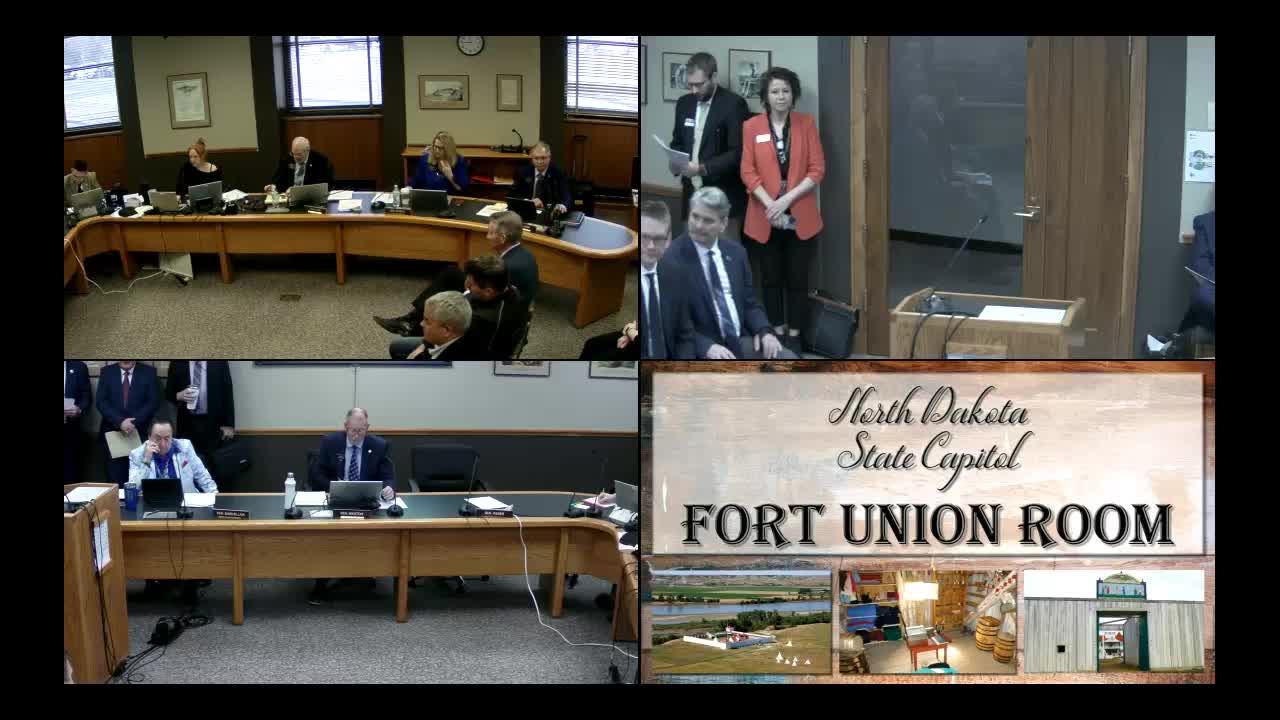Senate Ag Committee backs incentive program aimed at luring $450M potato processor to North Dakota
Get AI-powered insights, summaries, and transcripts
Subscribe
Summary
The Senate Agriculture and Veterans Affairs Committee voted to give House Bill 1332 a "due pass" after testimony that the measure would create a $30 million reimbursement grant program to attract large value‑added agricultural processing projects, including a proposed potato processing plant near Grand Forks.
BISMARCK, N.D. — The Senate Agriculture and Veterans Affairs Committee on Feb. 24 voted to give House Bill 1332 a due‑pass recommendation after extended testimony from state and local officials who said the bill would help recruit a large potato processing plant to North Dakota.
Representative Jared Haggart, sponsor of the bill, told the committee HB 1332 would add a value‑added agriculture facility incentive to the existing Ag Diversification and Development Fund and authorize a $30 million funding mechanism to support new, large processing facilities.
The bill would charge the Ag Diversification and Development Committee with developing the grant program. Under the proposal, grants would be reimbursement‑based: an eligible facility could receive up to half of a $30 million award (about $15 million) upon receiving a certificate of occupancy, and the remainder after achieving 50% of production capacity.
“The purpose of this bill is to add to the AD fund the responsibility of developing a value‑added ag facility and incentive funding mechanism,” Representative Haggart said. He listed six criteria for projects to qualify, including in‑state location, new construction on an industrial‑ready site with municipal infrastructure, a minimum facility capital investment of $350 million, and an estimated annual economic contribution of at least $20 million when fully operational.
North Dakota Agriculture Commissioner Doug Goring testified in support and framed the bill around a specific prospective investor previously described to the committee as a large, Belgium‑based potato processor weighing a roughly $450 million investment.
“I can truthfully say that in all the years that I’ve worked with these companies ... I’ve never seen this type of thorough review of a company,” Goring said, describing multi‑year field trials and due diligence the company has completed.
City and regional officials said local investment has already been made to prepare a site in Grand Forks. Todd Feland, Grand Forks city administrator, told the committee the city has spent nearly $30 million on infrastructure at the proposed site and offered more than $50 million in multi‑year incentives to improve competitiveness with a Wisconsin location.
“We are honored to be here,” Feland said. “This plant will serve 12 counties around us. ... It’s a regional play.”
Keith Lund, president and CEO of the Grand Forks Region Economic Development Corporation, summarized economic modeling the group and the Department of Commerce used for the project: roughly $450 million capital investment at the plant, about $150 million in on‑farm storage investments, several hundred permanent jobs, and thousands of construction jobs during development. Lund said state tax revenues generated during construction and operation were part of the rationale for the incentive structure.
Speakers representing growers, the Northland Potato Growers, seed certification, rural electric cooperatives, commodity groups and the governor’s office also testified in favor, stressing local grower support and the project’s potential to return acreage to potato production. Ken Birch, state seed commissioner, said the seed industry could grow 20–30% if the project proceeds as described.
Under HB 1332 as described to the committee, the Bank of North Dakota could extend a line of credit of up to $30 million to the agriculture commissioner to support the grant program; if the commissioner accessed the line, a deficiency appropriation from the Legislative Assembly would be requested. The bill contains a sunset clause set for June 30, 2029.
No proponents testified in opposition; one commenter representing on‑site wastewater contractors testified at a later hearing on a different bill and is not related to HB 1332.
Senator Merdahl moved a due‑pass recommendation on HB 1332; the committee recorded an affirmative roll call and the motion passed. The committee closed the hearing and indicated the bill would move forward for consideration by the full Senate.
Clarifying details recorded in testimony and included here are limited to items explicitly stated at the hearing: the $30 million grant ceiling administered as reimbursement; $15 million initial reimbursement; a minimum capital investment threshold of $350 million; an expected economic contribution threshold of $20 million; a potential Bank of North Dakota line of credit; and a sunset date of June 30, 2029.
The measures in HB 1332 would require further legislative action for appropriation or access to the proposed credit line and include conditions — such as certificate of occupancy and production thresholds — before payments would be made to recipients.
Outlook: Committee members and a broad set of agricultural, municipal and industry witnesses presented HB 1332 as a targeted incentive intended to secure a large, regionally significant potato processing plant. The bill proceeds with a due‑pass recommendation and will be scheduled for further action by the Legislature.
